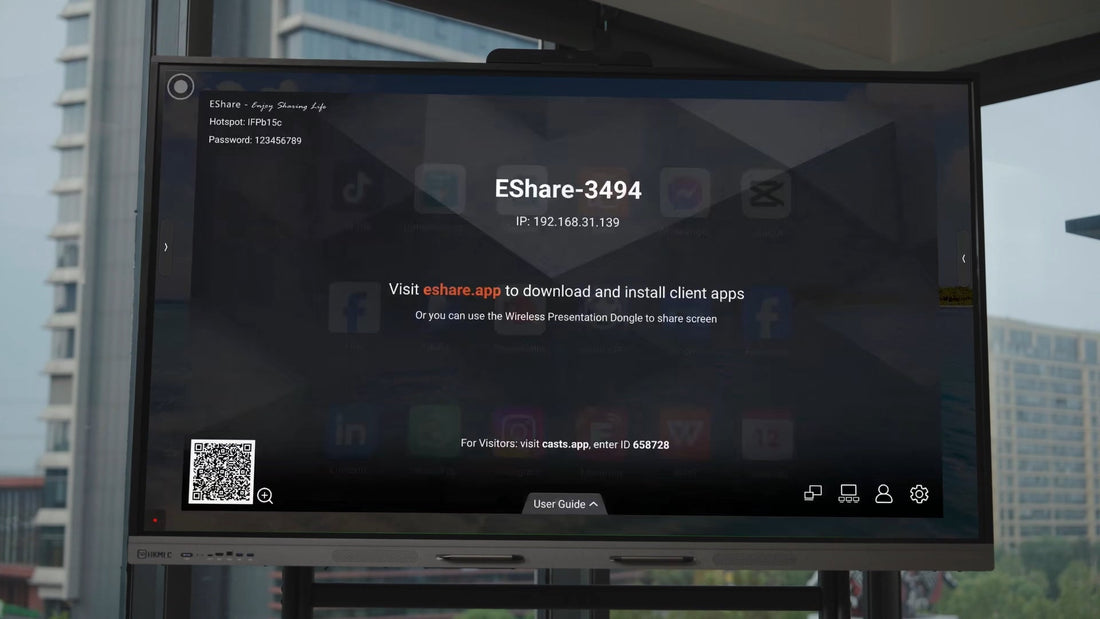
If you are going to set up your HKMLC Smart Board, one of the most important aspects that can affect your use of the device is selecting the right connection type to prevent problems. Whether you use a wireless or wired connection, each has its pros and cons. In this guide, we’ll compare both options so you can make an informed decision according to your needs.

Mobility and Flexibility – Users can be free to move about without worrying about cable constraints with wireless connectivity.
Easy Installation — Forget about the clutter of cables and connections; just connect over Wi-Fi or Bluetooth.
Multi-Device Compatibility — Yes, you can connect multiple devices laptops, tablets, and smartphones on the HKMLC Smart Board.
Tangle-Free Space – No tangled cables in the way, organize your environment.
Network Reliability Problems – Wireless signals are susceptible to interference and disconnections.
Latency and Lag – Depending on the Wi-Fi speed and bandwidth, there might be a small lag in the screen mirroring or interaction.
Security Issues – Wireless network systems are easy target of hackers and unauthorised access.
Pros of a Wired Connection
Steady Performance – An ethernet connection ensures a constant and dependable data transfer rate.
No Signal Interference – Wired connections are not susceptible to network traffic and environmental interference like Wi-Fi.
Higher Data Transfer Rate — HDMI, USB, or VGA results in smoother, higher-quality video and audio transmission
Improved Security – An in-person connection minimizes the chances of external hacking or unauthorized access.
Limited Mobility – In a wired setup, movement is restricted because devices must be physically connected.
Cable Turns into Mess – A lot of cables means a lot of mess and probably means you will need cable management.
Struggling Installation – It is cumbersome and tedious to keep and manage a multitude of wires and extraneous components.

Interactive Classrooms – Teachers can share content, with students using their own devices.
Conference Rooms – If you have a business meeting and multiple presenters, being able to quickly switch devices is a great benefit.
Dynamic Workspaces – Best suited for environments with frequent movement where flexibility is key.
Fixed Installations — The HKMLC Smart Board is installed in a non-portable environment, such as a meeting room or a classroom.
High Quality Presentation — Provides lag-free streaming of video and voice, which is perfect for lectures, training and media playback.
Security-Sensitive Environments — Organizations that deal with sensitive data may opt for a more secure wired connection.
Go to the Smart Board's network firmware settings.
Check for nearby Wi-Fi networks.
Choose the desired Wi-Fi and input the password.
Connect to Bluetooth devices (if necessary).
Check the connection for speed and stability.
Connect your device to the Smart Board using an HDMI, USB, or VGA cable.
Make sure the cables are plugged in securely.
Therefore, be sure to adjust the display settings for optimal resolution and performance.
Check the connection for sound and visual quality.
There are advantages to both a wireless and wired connection. If your work demands flexibility and convenience, the wireless option is a better choice. If you want the most reliable Internet, though, with the best stability and performance, you need a good wired connection.
Whichever you prefer, the HKMLC Smart Board comes with the option of both wireless and wired, leaving you open to select whichever you find more pleasing for the best-user experience.
View our new HKMLC Smart Board range and other smart connectivity solutions: HKMLC Smart Board Products.
No comments
0 comments